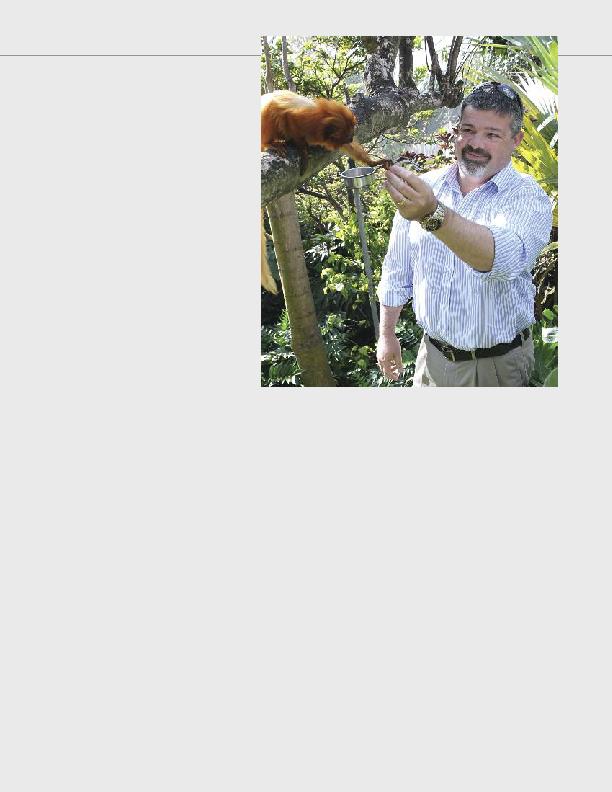
"Dr. Doolittle," the fictional surgeon of the 1920s
children's book series whose penchant for non-
human patients takes him from Africa to the moon
and back. As a veterinarian and Principal Curator
of Bermuda Aquarium, Museum & Zoo, Dr.
Walker's life is just as peripatetic; one day he might
be operating on an injured tree kangaroo, leading
an offshore reef tour, or removing fishing line from
a turtle's gut; the next, he's rescuing a stranded seal
or making sure the lemur troupe doesn't get bored.
whose mother, Kay Walker Steele, taught at
Cavendish and the Junior School for 39 years.
2004 to take a leading role at the Island's long-time
top attraction. Over the past decade, he has been
instrumental in taking BAMZ to a world-class
level, making it a facility with state-of-the-art
animal care and people-pleasing infrastructure, as
well as ramping up programme offerings, such as
the Bermuda Zoological Society's free, on-site
science classes for thousands of local students.
Ian helped drive the successful $8.4-million BZS
capital campaign and oversaw BAMZ's all-important
re-accreditation by the Association of Zoos &
Aquariums (AZA). He went on to custom-design a
3,600-sq-ft Animal Care Centre--complete with
surgery, pharmacy, laboratory, zoo kitchen and
quarantine rooms--and guided creation of a
dynamic free-flight, walk-through exhibit,
"Madagascar: Land of Mystery & Wonder," which
opened in 2011. Since then, he has engineered this
spring's opening of a waterfront café at BAMZ and
is overseeing replacement of the Aquarium's roof.
to the university of Edinburgh for five years of
veterinary studies. After graduation, he worked for
a short time in small-animal medicine in Aberdeen,
and at BAMZ as an aquarist, before joining the
National Aquarium in Baltimore for six years. He
helping injured whales, seals and dolphins.
at Saltus Secondary) and son Liam (S5) in tow, Ian
was keen to bring to BAMZ what he'd learned
overseas in exotic animal care and wildlife rehab.
and philosophically," he says. "They have an education
mission these days. It's about the environment--
why it's important to protect it. That's what we're
here for: to raise awareness and, where possible,
to make a difference in the natural world. Zoos are
increasingly becoming `arks' for wild species that
wouldn't otherwise survive in the wild because their
natural habitat has disappeared."
prepared him well for his challenging career. "I
wanted to be a vet since I was 12," he says. "It's a
hands-on job; you're using your skills and the
science you have learned to sort out challenges in
almost everything you do."
Walker / '89
"arks" for
wild
species
that
wouldn't
otherwise
survive in
the wild'
A